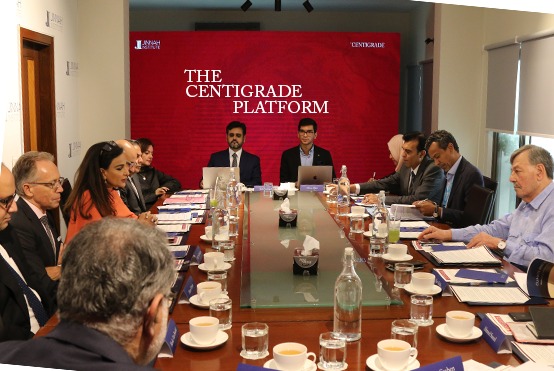Centigrade
The Centigrade Platform: Financing Climate Action for Pakistan
Date: September 15, 2023
Speaking at Jinnah Institute’s newly launched Centigrade Platform, set up to amplify policy discourse, knowledge-based collaborations and resilience advocacyin Pakistan’s climate and environment space, a panel of high level experts and thought leaders all agreed that Pakistan needs to level up its climate and development governance to be able to meet the challenges of the 21st century. While Climate Finance was the focus of the first Centigrade Immersive at JI, speakers addressed multiple roadblocks and ideas at the multilateral and national level in accessing finance for both resilience and mitigation goals.
Kicking off the policy convening with a few roadmap goals for the country, Sherry Rehman explained that the idea behind Centigrade is to generate science-based climate leadership and communications for amplifying the scale and urgency of the emergencies facing communities in developing countries like Pakistan, as well as fostering capacity towards emerging and existing crises, both sectoral and national.
Speakers identified technical capacity and coordination obstacles as two of the fundamental deficits in moving forward with leveraging opportunities in the face of a serious triple planetary crisis, in which Pakistan had now emerged as the poster-child for climate disruptions.
UN Resident Coordinator, Julien Harneis suggested that there was a need to tally Pakistan’s receipt of climate funds against other vulnerable countries and any variance should be examined in terms of absorptive capacity.
Samuel Rizk, Resident Representative UNDP Pakistan, stated that climate finance opportunities for a lower middle-income country (LIMC) like Pakistan were limited, and a finance and investment combination was more likely to be the solution. For development partners like UNDP to assist Pakistan, there were key challenges to consider such as the regulatory environment, deficits in human capital and technical capacity that caused slower progress, he added.
Abdullah Fadil, Country Representative UNICEF, observed that the current distribution of climate finance is slanted towards integration, not inclusion. 75% climate related investments are made in hard infrastructure, as opposed to investments in resilience of vulnerable communities. He highlighted data from UNICEF’s MICS showing that 40% of Pakistani children face nutritional stunting, impacting economic growth. Fadil emphasized the need to prioritize inclusive development in climate finance strategies.
Australian High Commissioner, H.E. Neil Hawkins shared lessons from Australia’s climate adaptation efforts, which have seen success through integration of new agriculture technologies. He urged Pakistan to intensify its climate vulnerability advocacy through its embassies abroad and donor support in Islamabad. He recommended the inclusion of the climate minister in Pakistan’s national security committee, mirroring Australia’s approach.
Dr. Abid Suleri, Executive Director SDPI, criticized the dependency of Geneva Pledges on IMF clearance for countries like Pakistan, terming it unfair. He proposed exploring Debt for Nature Swaps as an alternative climate finance method.
Climate finance specialist Kashmala Kakakhel encouraged Pakistan to explore profitable avenues in climate finance beyond donor-client setups, emphasizing the potential in carbon trading. Hadika Jamshed, carbon finance specialist, noted the absence of a UNFCCC rulebook on carbon financing, highlighting an opportunity for Pakistan.
Senior economist Ijaz Nabi advocated for stronger academia-government collaboration in climate action and emphasized enhancing governance before seeking climate finance. Ali Tauqeer Sheikh noted the inadequate governmental assessments of development projects, while Amb. Shafqat Kakakhel pointed out the disorganized implementation of climate policies.
Sherry Rehman wrapped up the discussion by stating the need to carry forward the momentum generated at the Centigrade Immersive. She highlighted our collective responsibility to amplify the urgency of the climate crises facing communities in developing nations like Pakistan.
Other participants at the event included World Bank Senior Disaster Risk Management Specialist Ahsan Tehsin, UN Assistant Resident Representative Amir Khan Goraya, Australian First Secretary Danielle Cashen and Head Social & Environmental Policy Habib Bank, Ahmed Saeed.

